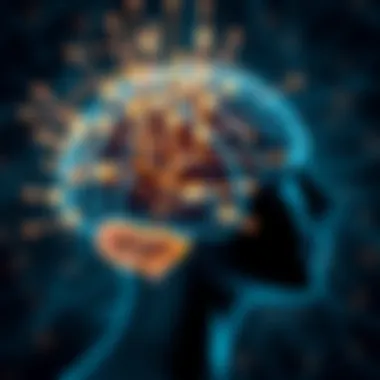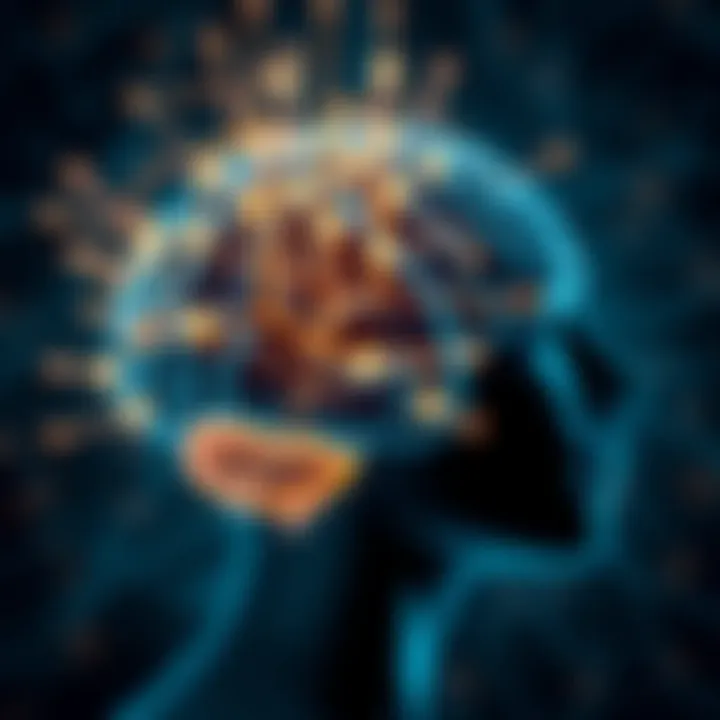Understanding ADHD Rejection Sensitivity Dysphoria


Intro
Emotional challenges can often feel like tangled webs, and for individuals with Attention Deficit Hyperactivity Disorder (ADHD), these webs can become substantially more complex. One particularly intricate issue is Rejection Sensitivity Dysphoria (RSD). This emotional response to perceived rejection or criticism can have a profound impact on one’s self-esteem, relationships, and overall mental health. Understanding this aspect of ADHD is crucial.
In this article, we will explore the landscape of ADHD Rejection Sensitivity Dysphoria. You will gain insights into how this phenomenon manifests, the underlying mechanisms at play, and clinical implications. Through a comprehensive examination, we aim to share strategies that foster resilience and promote a healthier emotional state among those affected.
Understanding Mental Health and Well-being
What is Mental Health?
Mental health encompasses our emotional, psychological, and social well-being. It influences how we think, feel, and act, ultimately shaping how we handle stress, relate to others, and make choices. For individuals with ADHD, their mental health landscape may be filled with unique challenges which can amplify feelings of rejection and inadequacy.
The Importance of Prioritizing Mental Well-being
Prioritizing mental wellness is about recognizing and attending to our emotional needs. Just as we tend to our physical health, nurturing our mind is equally vital. Unaddressed emotional struggles can spiral into more significant mental health issues, complicating daily life and self-perception for those with ADHD.
Common Mental Health Challenges and Disorders
For individuals with ADHD, mental health challenges such as anxiety disorders, depression, and relationships issues can frequently coincide with RSD. People can experience unanticipated emotional turbulence, increased sensitivity to criticism, and fluctuating self-esteem levels. Understanding these overlaps is crucial in providing effective support and promoting well-being.
Strategies for Improving Mental Health
Self-care Techniques and Practices
To combat emotional turbulence, individuals can utilize various self-care practices. Engaging in activities that promote relaxation, like reading or spending time in nature, can provide a grounding influence. Here are a few techniques:
- Establish a Routine: Consistency in daily activities can create a sense of stability.
- Acknowledge Emotions: Understand that it’s okay to feel what you feel; self-compassion matters.
- Engage in Hobbies: Pursuing interests can serve as an emotional outlet.
Building Resilience and Stress Management
Building resilience involves developing a robust framework for handling stress and emotional upheaval. Practicing stress management techniques, such as deep breathing or physical exercise, can significantly alleviate emotional distress. Resilient individuals often bounce back from emotional setbacks, which is essential for those grappling with RSD.
Seeking Professional Help: Therapy and Counseling
When feelings of rejection become overwhelming, consulting a mental health professional can be immensely beneficial. Therapists can provide tailored therapies aimed at understanding emotional responses, addressing RSD, and developing coping strategies. Cognitive-behavioral therapy, in particular, can offer pathways to reshape negative thought patterns.
Finding Balance in Life
Healthy Lifestyle Choices: Diet, Exercise, and Sleep
A healthy lifestyle can bolster mental well-being significantly. Implementing a well-rounded diet, regular exercise, and sufficient sleep contributes positively to emotional and cognitive functions.
Mindfulness and Meditation Practices
Mindfulness encourages individuals to stay present in the moment. Practicing meditation can help reduce anxiety and improve emotional regulation. Simple mindfulness exercises can be incorporated into everyday routines, providing a sense of peace amidst emotional turmoil.
Setting Boundaries and Managing Time Effectively
Balancing responsibilities and personal time is vital. Setting clear boundaries at work and home can reduce stress and emotional fatigue. Time management tools can ease the mental load, ensuring that individuals can prioritize self-care alongside their obligations.
Enhancing Personal Development
Goal Setting and Productivity Tips
Setting realistic and achievable goals fosters a sense of accomplishment. This increases motivation and serves as a reminder of personal capabilities. Using productivity tools, such as planners, can keep progress in check.
Building Healthy Relationships and Social Connections
For individuals struggling with RSD, nurturing healthy relationships is crucial. Surrounding oneself with supportive individuals who offer acceptance can provide emotional security. It is essential to cultivate connections that reinforce positivity and diminish feelings of rejection.
Practicing Gratitude and Positivity
Gratitude exercises, such as daily reflections on what one is thankful for, can shift focus from negative thoughts. Practicing positivity can create a buffer against the emotional fallout of rejection sensitivity.
Tips for Maintaining Mental Well-being
Strategies for Preventing Burnout
Burnout can exacerbate symptoms of RSD. To prevent it, balance workload and leisure activities. Taking regular breaks and engaging in restorative practices can replenish energy and enhance well-being.
Coping with Challenges and Setbacks
It's important to have coping strategies that work. Whether it’s journaling, talking to a friend, or using art as an outlet, find what helps in navigating emotional rough patches.
Creating a Supportive Environment
Finally, creating an environment that promotes positivity and support makes a tremendous difference. This can involve arranging a calming workspace or surrounding oneself with encouraging people, both of which can mitigate the strains of RSD.
In summary, navigating the emotional landscape of ADHD Rejection Sensitivity Dysphoria requires a multifaceted approach. By understanding the dynamics of mental health and implementing effective strategies, individuals can foster resilience and enhance their emotional well-being.
Defining ADHD Rejection Sensitivity Dysphoria
Understanding ADHD Rejection Sensitivity Dysphoria (RSD) is crucial for those touched by Attention Deficit Hyperactivity Disorder. It’s not just a footnote in psychological literature; it’s a core feature that shapes the day-to-day experiences of many. To unravel this complexity, we need to explore the nuances of how this emotional dysphoria affects individuals. Ignoring it can lead to unnecessary suffering and misunderstandings in both personal and social contexts.
When discussing RSD, it’s essential to distinguish it from other emotional challenges. This nuanced understanding can help in tailoring effective strategies and interventions. Furthermore, recognizing that RSD is not merely an overreaction, but rather a profound emotional response can influence how educators, friends, and family interact with those affected.
Conceptual Framework


The conceptual framework for ADHD Rejection Sensitivity Dysphoria revolves around its roots and manifestations. It stems from the unique wiring of the ADHD brain, which often heightens emotional responses. Picture it like a rain gauge; whereas some people might need a storm to feel emotions, individuals with RSD can perceive light rain as a downpour. This shift in perception can color social interactions, leading to heightened feelings of rejection or inadequacy.
Here are some key aspects to consider:
- Emotional Reactivity: Individuals often find themselves on a rollercoaster of reactions, where perceived rejection feels real and immediate.
- Fear of Judgment: There’s a pervasive fear of what others think, rising from early experiences of being misunderstood or dismissed.
- Social Withdrawal: To avoid the pain of rejection, some might retreat from friendships or social engagements entirely.
Incorporating these viewpoints into everyday conversations can foster understanding, paving the way for deeper dialogues about emotional well-being among those with ADHD.
Distinguishing Dysphoria from General Emotional Responses
It's easy to conflate rejection sensitivity dysphoria with general emotional responses. While both involve feelings, RSD takes the cake when it comes to intensity and specificity. Regular emotional responses may ebb and flow; however, RSD can feel like a tidal wave, pushing individuals into a sea of anxiety and despair with little provocation.
To clarify:
- Emotional Dysregulation: Individuals with RSD exhibit consistent emotional instability triggered by perceived rejection.
- Chronic Shame: Unlike normal emotional fluctuations, RSD can induce a cycle of shame that seems difficult to break.
- Heightened Sensitivity: This prolonged emotional turbulence leads to a deeper sensitivity towards social cues that might go unnoticed by others.
Understanding these distinctions is vital. It allows both individuals and their loved ones to draw a clear line between typical emotional reactions and the profound suffering that characterizes this specific dysphoria.
"RSD is not just about feeling rejected; it's about the deeply embedded belief that one is unlovable or unworthy of acceptance, often leading to a self-fulfilling prophecy."
By grounding discussions in an accurate conceptual framework, we can better support those navigating ADHD Rejection Sensitivity Dysphoria, fostering acceptance and empathy in their emotional landscape.
For further insights into mental health, resources such as Wikipedia, Britannica, and Reddit offer valuable perspectives on understanding and coping with various emotional challenges.
The Neurological Underpinnings
The exploration of ADHD Rejection Sensitivity Dysphoria necessitates an understanding of its neurological foundations. This aspect is crucial because it sheds light on how specific brain structures and pathways contribute to the intense emotions that characterize this condition. By grasping these underlying mechanisms, individuals experiencing dysphoria can gain valuable insights into their reactions, empowering them to seek appropriate strategies for managing their emotional landscape.
Brain Structures Involved
Several brain structures play pivotal roles in emotional processing and sensitivity. Among these, the prefrontal cortex, amygdala, and insula are particularly significant for individuals with ADHD.
- Prefrontal Cortex: This area is crucial for executive functions, including decision-making, impulse control, and emotional regulation. Dysfunction in the prefrontal cortex may contribute to impulsivity and challenges in managing emotions, which are commonly experienced by those with ADHD.
- Amygdala: This structure is the emotional hub of the brain. It processes emotions like fear and pleasure and is particularly sensitive to perceived social threats. For someone suffering from rejection sensitivity, an overactive amygdala can heighten feelings of distress when faced with potential rejection.
- Insula: This region integrates sensory information with emotional experience. Its involvement can lead individuals to have heightened awareness and sensitivity to their internal emotional states, making them more reactive to perceived rejection.
These areas work in concert, and imbalances can lead to emotional dysregulation, an essential characteristic of ADHD Rejection Sensitivity Dysphoria.
Dopaminergic Pathways and Emotional Processing
The role of dopamine in emotional processing and behavior regulation cannot be understated. ADHD is often linked to dysregulation of dopaminergic pathways, which are essential in managing reward, pleasure, and emotional responses. The pathways associated with dopamine have direct implications for how individuals process rejection and emotional pain.
- Traits of Dysfunction: A malfunctioning dopamine system may result in low motivation and heightened anxiety, which can exacerbate feelings of rejection. Individuals might find themselves bouncing from euphoria to despair based on their social interactions, leading to a turbulent emotional state.
- Sensitization: When the brain's dopaminergic system becomes overly sensitive to potential rejection, it may trigger extreme emotional responses. In a social setting, this sensitivity could manifest as withdrawal, aggression, or profound sadness—all stemming from a fear of rejection.
- Management: Understanding these pathways allows individuals to develop targeted coping strategies. With tools such as cognitive-behavioral techniques and psychoeducation, it can be much easier to navigate the challenges of emotional dysregulation tied to rejection sensitivity.
By recognizing the intricate interplay of these neurological factors, individuals can begin to better understand their emotional experiences and develop techniques that foster resilience.
"Understanding the mechanisms behind rejection sensitivity not only illuminates emotional experiences but paves the path for effective interventions."
For deeper insights into ADHD and its neurological basis, consider checking resources on sites like PubMed or American Psychological Association.
Identifying Symptoms of Rejection Sensitivity
Understanding the symptoms of rejection sensitivity is crucial for individuals with ADHD and their families. This awareness shapes the contours of their emotional landscape, helping to illuminate the often murky waters of emotional responses to perceived rejection. By identifying these symptoms, one can grasp the intensity of feelings involved, potentially opening pathways for more effective coping strategies and supportive interventions. Knowing what to look for in oneself or loved ones can enhance both empathy and understanding, creating a more nurturing environment for those affected by this phenomenon.
Common Emotional Reactions
When one experiences rejection sensitivity, the emotional spectrum can be quite expansive. It's not simply about feeling a little blue after someone misses your call or doesn’t invite you to a party. Instead, it can evoke a flurry of intense feelings which might include:
- Overwhelm: A feeling that sensations are compressing you from all sides, leading to heightened emotional responses.
- Anxiety: This could manifest as increased worry about social interactions, creating a vicious cycle that further amps up sensitivity.
- Anger: Sometimes it’s not sadness; instead, an intense frustration can erupt—often directed at oneself for feeling vulnerable.
- Embarrassment: Feelings of inadequacy may surface, especially in situations where criticism is perceived, no matter how trivial.
For those experiencing ADHD Rejection Sensitivity Dysphoria, these emotional reactions aren’t mere mood swings. They’re deeply felt responses that can seem immediate and overwhelming, like being tossed into a turbulent sea without a life preserver.
Physical Manifestations
The body’s reaction to emotional states is undeniably linked to how we experience our feelings. In the case of rejection sensitivity, the physical symptoms can be subtle yet profoundly disconcerting. These manifestations may vary widely, and they can often overlap with other conditions, leading to misinterpretations of one's mental state. Here are some common physical reactions:
- Tension: Muscles might tighten, especially in the shoulders and neck, making relaxation seem like an unattainable goal.
- Fatigue: The emotional exhaustion from constant alertness to possible rejection can leave the individual feeling fatigued in both body and mind.
- Sweating: Sudden feelings of anxiety can manifest as increased perspiration, which might feel puzzling in non-stressful situations.
- Headaches: Tension and anxiety can lead to headaches or migraines, turning emotional distress into physical pain.
These physical signs often intertwine with the emotional responses discussed earlier, amplifying the sense of distress and isolation.
"Rejection sensitivity isn’t just an emotional experience; it’s a full-body phenomenon that impacts mental and physical states alike."
While not everyone will present with the same symptoms, recognizing and understanding one’s own triggers is vital in fostering greater self-awareness. This often becomes an empowering step towards building resilience in one's emotional health.
Impact on Self-esteem and Relationships
The relationship between ADHD Rejection Sensitivity Dysphoria and self-esteem is like a double-edged sword, both influencing and overlapping in significant ways. When individuals with ADHD face rejection or criticism, it can not only deepen feelings of inadequacy but also create a sense of shame that is hard to shake off. This cycle perpetuates a negative self-image and can lead to further avoidance of social interactions, thus creating a vicious cycle that affects their overall well-being and relationships.
The Cycle of Shame and Doubt
In addressing rejection sensitivity, one cannot ignore the visceral cycle of shame and doubt that often accompanies it. When someone with ADHD perceives disapproval, even if it’s not overt or intended, they may react strongly. This response often feels like a personal attack, regardless of the intent behind the criticism. The immediate feelings may lead to internal dialogue that is harsh and unforgiving. Thoughts such as "I always mess things up" or "I’m not worthy of love or respect" start to cloud their self-perception.
Over time, this cycle plays out in predictable patterns:
- Perceived Rejection: This can come from family, friends, or colleagues. If an individual believes they are being rejected or criticized, the feelings intensify.
- Emotional Overreaction: Instead of processing these feelings in a healthy way, individuals might experience anger, sadness, or anxiety. These intense reactions can further alienate them from their support systems.
- Withdrawal: Faced with these emotions, the instinct often shifts towards isolation. The avoidance of situations where rejection is possible may emerge, preventing personal or professional connections.
- Reinforced Self-doubt: This withdrawal reaffirms the fear of acceptance and escalates the cycle of shame, as the person may feel further distanced from their loved ones or peers.
Breaking this pattern isn’t easy but acknowledging that these feelings are part of ADHD Rejection Sensitivity can be liberating. Through targeted strategies, individuals can slowly begin to dismantle the cycle, leading to improved self-acceptance.
Navigating Interpersonal Relationships
Navigating relationships with a heightened sensitivity to rejection creates unique challenges. Social interactions become laden with anxiety and a fear of misunderstandings. However, there arises a necessity to learn effective handling of interpersonal dynamics to foster healthier relationships.


- Open Communication: Transparency in expressing feelings can be vital. For instance, when entering a social situation, informing peers that they may respond strongly to perceived slights can help pave the way for supportive interactions.
- Building Trust: It’s essential to surround oneself with trustworthy individuals who are willing to engage in honest, compassionate conversations. Trust lays the groundwork for openness, mitigating feelings of rejection when issues arise.
- Recognizing Triggers: Understanding personal triggers can be a game changer. By pinpointing situations that frequently lead to feelings of rejection, individuals can develop coping mechanisms for handling those specific stressors.
- Seeking Support: If dealing with rejection sensitivity becomes overwhelming, involving a mental health professional could be beneficial. A structured setting can provide the tools needed to manage emotions effectively and cultivate positive relationships.
- Emphasizing Self-compassion: Understanding that rejection is a universal experience can lower the stakes in interpersonal dynamics. Fostering self-compassion helps mitigate excessive fears and empowers individuals to engage more openly.
Coping Mechanisms and Strategies
When considering ADHD Rejection Sensitivity Dysphoria, the role of coping mechanisms and strategies is pivotal. Individuals with this condition often navigate turbulent emotional waters, where rejection triggers profound emotional pain and can create a cycle of anxiety and negative self-assessment. Understanding and applying effective coping strategies not only helps to manage emotional responses but also fosters resilience, allowing individuals to lead a more balanced life.
Coping mechanisms provide crucial tools for managing emotional dysregulation. These tools enable individuals to reframe their thoughts and actions when facing perceived rejection. By recognizing and addressing rejection sensitivity, a person can shift their focus from the pain of perceived inadequacy to strategies for emotional regulation.
Benefits of implementing coping mechanisms:
- Enhances Emotional Regulation: These strategies help individuals better manage their emotional responses, reducing instances of overwhelming feelings of sadness and frustration.
- Promotes Resilience: Engaging with coping techniques increases one’s resilience, allowing them to weather emotional storms more effectively.
- Improves Self-Esteem: Successful coping can lead to gradual improvements in self-esteem, enabling individuals to view themselves more positively despite past experiences of rejection.
It’s also important for individuals to choose coping methods that are suitable for their personality and lifestyle. Below, we dive deeper into two particularly effective strategies: cognitive-behavioral techniques and mindfulness practices.
Cognitive-Behavioral Techniques
Cognitive-behavioral techniques (CBT) represent a foundational structure for addressing the thought patterns that contribute to rejection sensitivity. At its core, CBT helps individuals identify negative thoughts and replace them with healthier, more constructive ones. For someone experiencing dysphoria from rejection sensitivity, this can mean transforming thoughts like "I’m not good enough" into "I am valuable and have strengths."
The following steps can guide individuals in applying CBT:
- Identify Negative Thoughts: Keep a thought diary to record instances of negative self-talk or emotions following a perceived rejection.
- Challenge These Thoughts: Analyze the validity of these thoughts. Are they based on facts or emotions?
- Reframe Thoughts: Cultivate alternative perspectives that are more realistic and positive.
"Cognitive restructuring can be a game changer, enabling individuals to break free from limiting beliefs."
Mindfulness and Acceptance Practices
Mindfulness and acceptance practices present another layer of coping mechanisms ideal for managing rejection sensitivity. Mindfulness encourages individuals to develop an awareness of the present moment and cultivate an attitude of acceptance towards their feelings without judgment. This practice can help in acknowledging painful emotions stemming from rejection without becoming overwhelmed by them.
Here are some methods to incorporate mindfulness and acceptance practices into daily life:
- Mindful Breathing: Focus on breathwork for a few minutes each day; this can ground an individual during moments of emotional distress.
- Meditation Practices: Simple guided meditations can help individuals observe their thoughts and feelings from a distance, reducing the intensity of emotional responses.
- Journaling: Reflective journaling can help process emotions. Writing down feelings in response to rejection can provide insights and empower readers to confront and manage those emotions.
Integrating these techniques can facilitate a gradual shift in one’s approach to handling emotional pain while promoting overall emotional well-being.
In summary, effective coping mechanisms and strategies significantly enhance the ability to navigate the emotional landscape characterized by ADHD Rejection Sensitivity Dysphoria. By engaging in cognitive-behavioral techniques and practicing mindfulness, individuals can empower themselves, cultivate resilience, and foster a healthier self-image.
Therapeutic Approaches
Therapeutic approaches play an essential role in managing ADHD Rejection Sensitivity Dysphoria effectively. They provide individuals with tools to navigate their complex emotional landscape. These approaches not only aim to mitigate the intense feelings of rejection but also enhance overall emotional well-being. By tailoring strategies to individual needs, therapy can reinforce positive self-identity and promote healthier coping mechanisms.
Considering the emotional turmoil faced by those with rejection sensitivity, it’s vital to integrate both medication and psychotherapy into treatment plans. Each approach carries its specific benefits and considerations that can contribute to a lasting change.
Medication and ADHD Management
Medication is often a cornerstone in managing ADHD. Those with rejection sensitivity may benefit from stimulant medications like methylphenidate or non-stimulant options like atomoxetine. These medications help improve attention and reduce impulsivity, which can indirectly diminish some emotional responses.
However, it’s crucial to acknowledge the delicate balance when prescribing medication to manage rejection sensitivity.
- Benefits:
- Considerations:
- Regulates dopamine levels, improving emotional reactivity
- Reduces impulsivity that can amplify feelings of rejection
- Enhances focus, resulting in better social interactions
- Possible side effects, including mood swings or anxiety
- Varied effectiveness across individuals, requiring careful monitoring
- The necessity of combining medication with psychotherapy for superior outcomes
The choice of medication should always follow a thorough evaluation by a qualified professional to tailor the treatment to the individual's emotional needs. Maintaining open communication about the effects and side effects can aid in finding the most effective approach.
Psychotherapy Techniques
Psychotherapy offers a platform for individuals to explore their feelings and build emotional resilience. Techniques such as Cognitive Behavioral Therapy (CBT) and Acceptance and Commitment Therapy (ACT) can be particularly effective in treating rejection sensitivity in individuals with ADHD.
Through Cognitive Behavioral Therapy, patients can learn to identify and alter negative thought patterns associated with perceived rejection. This method encourages a reframe of their emotional responses to more constructive ones.
- Common Techniques within CBT include:
- Behavioral Activation: Encourages engaging in meaningful activities to combat feelings of worthlessness
- Thought Records: Helps identify and challenge irrational thoughts contributing to emotional distress
On the other hand, Acceptance and Commitment Therapy delves into fostering acceptance of painful feelings of rejection while committing to values and actions that lead to a fulfilling life. It aims to defuse emotions rather than eliminate them, recognizing feelings as a part of the human experience.
- Key Elements of ACT include:
- Mindfulness Practices: Cultivates awareness of one’s thoughts and feelings without judgment
- Values Clarification: Aids individuals in identifying what truly matters to them, promoting motivation for change
Both medication and psychotherapy techniques are significantly beneficial within a comprehensive treatment program for ADHD Rejection Sensitivity Dysphoria. They work together to address not just the symptoms but the root emotional issues.
Combining these therapeutic approaches creates an environment conducive to healing and growth. Integrating health care professionals who understand the nuances of ADHD and its emotional implications is crucial for anyone navigating this challenging landscape.
The Role of Support Systems
Navigating the emotional waters of ADHD Rejection Sensitivity Dysphoria can be daunting. In this landscape, the presence of support systems becomes a critical element for individuals grappling with these heightened emotional responses. Support systems aren’t just emotional crutches; they offer a robust framework to help manage feelings of rejection and dysphoria, fostering resilience and personal growth.
One of the most significant benefits of having a solid support network is the sense of belonging it instills. Individuals with ADHD often feel isolated in their emotional experiences. Having family or friends who understand rejection sensitivity can provide validation and a sense of security. This acceptance can greatly alleviate feelings of inadequacy that often accompany ADHD dysphoria. Such emotional nourishment isn't merely about kindness; it's grounding, creating an emotional safety net that helps individuals build coping strategies over time.
Moreover, support systems can act as effective mirrors. Family and friends can reflect back positive affirmations when self-doubt creeps in. When these vital people remind an individual of their strengths, it bolsters self-esteem and fortifies one's sense of worth. Celebrating small victories with a supportive circle can mean the difference between task avoidance and healthy engagement. In contrast, a lack of support can exacerbate feelings of rejection, leading to a downward spiral that feels nearly impossible to escape.
Apart from emotional reassurance, practical support is equally invaluable. Support systems can help individuals identify triggers that heighten dysphoria and encourage the utilization of coping strategies effectively. Coordinated efforts, such as attending therapy together or exploring resources and interventions, demonstrate a communal commitment that can significantly elevate one’s emotional resilience.
Furthermore, the cultural context of support systems also plays a role. Different families and communities have varying attitudes towards mental health. Understanding these dynamics is crucial. In cultures where mental health discussions are stigmatized, the need for advocates or allies cannot be overstated. It becomes essential for individuals within such frameworks to find quiet advocates, whether from allies in the community or online forums where open discourse about ADHD and its implications on emotional health is happening. Digital communities, like those found on reddit.com, provide a platform where individuals can share experiences and resources without fear of judgment.
Engaging actively in these support systems, be they family-based or community oriented, is an ongoing commitment. It requires diligence, empathy, and a willingness to communicate openly. The act of leaning on these support structures may feel uncomfortable at times, but it’s a vital step in fostering emotional resilience against rejection sensitivity. When a person has a robust support system backing them up, they’re often better equipped to tackle their emotional hurdles.


Just like a house built on a solid foundation, emotional well-being is fortified by supportive relationships.
Family Support Dynamics
Family dynamics play a crucial role in shaping the emotional landscape of individuals experiencing ADHD Rejection Sensitivity Dysphoria. Family members serve as foundational pillars; their responses to an individual's struggles can create either a nurturing environment or a tumultuous one. When families prioritize understanding and empathy, it can significantly reduce the emotional burden associated with rejection.
Sharing familial experiences can foster stronger bonds, particularly in families where ADHD is present across generations. By opening dialogue about shared sensitivities, family members can better understand each other. Those insights often cultivate meaningful conversations that can help reshape negative thought patterns or feelings triggered by dysphoria. Consider implementing regular family check-ins where everyone has a safe space to express their feelings and concerns. Such practices build emotional intimacy, which can act as a buffer against the sting of rejection.
However, navigating family roles isn’t always straightforward—especially in families that may not fully understand ADHD or its emotional ramifications. Misunderstandings or dismissive attitudes can lead to feelings of isolation. In such cases, it might be beneficial to leverage external resources, such as educational workshops or support groups designed specifically for families of ADHD individuals. In this way, family members can develop essential knowledge and skills to support one another effectively.
Ultimately, family support isn't about fixing problems. It’s about creating a space where emotional expression is safe and gradual healing can take place. For individuals dealing with ADHD Rejection Sensitivity Dysphoria, having that kind of environment can mean the world.
Peer Support and Community Resources
Peer support and community resources represent invaluable lifelines for individuals coping with ADHD Rejection Sensitivity Dysphoria. Unlike familial dynamics, peer relationships often offer different perspectives that can amplify one’s coping strategies. The sheer act of connecting with someone who has shared similar experiences can lessen feelings of isolation and validate one’s emotional turmoil.
Peer support groups, whether in-person or online, create opportunities for open discussions about rejection sensitivities. They allow individuals to share coping mechanisms that have worked for them. These exchanges often lead to practical insights, like techniques for managing emotional triggers or feedback on effective coping strategies. Websites like facebook.com house many groups tailored for ADHD discussions, where individuals can find camaraderie and shared understanding.
Community resources, on the other hand, are essential for amplifying knowledge and tools. Local organizations or mental health centers often conduct workshops focused on ADHD and emotional health. Many community libraries also feature resourceful materials—books, pamphlets, and educational videos—that provide deeper insights into the complex interplay between ADHD and emotional responses. Utilizing such resources is vital, as education is often the first step in taking control of emotional challenges.
Another avenue that shouldn’t be overlooked is advocacy groups. National organizations dedicated to ADHD can offer a plethora of resources—from updates on the latest research to therapy options tailored to individuals with rejection sensitivity. Engaging with these networks can yield not only knowledge but also collaborations for awareness campaigns that foster a broader understanding of such emotional experiences.
When individuals tap into these peer supports and community resources, they not only curate their coping toolkit but also redefine their social landscape, creating a connected, supportive community to lean on in times of emotional distress. Without a doubt, the interplay between personal and collective support can lead to a more enriched understanding of ADHD Rejection Sensitivity Dysphoria and its management.
Long-term Prognosis
Understanding the long-term prognosis of ADHD Rejection Sensitivity Dysphoria (RSD) is crucial for both individuals affected by this condition and the mental health professionals who support them. This exploration can shed light on the trajectory of emotional well-being and quality of life for those who navigate this unique emotional landscape. Recognizing the implications of RSD not only bolsters awareness but guides effective management strategies for sustained wellness.
Potential Outcomes of Untreated Dysphoria
When ADHD Rejection Sensitivity Dysphoria is left unchecked, the fallout can affect multiple facets of an individual's life. Here are several potential outcomes:
- Chronic Emotional Distress: Individuals may experience ongoing feelings of sadness and anxiety, which can lead to depression over time.
- Reduced Quality of Life: The fear of rejection can create barriers in both personal and professional realms, limiting opportunities and diminishing satisfaction in relationships.
- Isolation: Avoiding social situations due to fear of being misunderstood or rejected can foster a sense of loneliness, leading to an even deeper emotional void.
- Self-Loathing: Extended periods of dysphoria can foster negative self-perception, where individuals may internalize the pain associated with perceived rejection, further entrenching feelings of worthlessness.
"Understanding RSD is not just about recognizing symptoms; it’s about acknowledging the profound impact it can have on one's aspirations and relationships."
Possibilities with Effective Intervention
Conversely, addressing ADHD Rejection Sensitivity Dysphoria with effective intervention can steer individuals towards more positive outcomes:
- Emotional Resilience: Through targeted therapies and coping strategies, individuals can develop resilience against the emotional storms that rejection sensitivity often conjures.
- Strengthened Relationships: With proper support, individuals can learn communication techniques that foster healthier interactions, helping to build lasting relationships that stand the test of emotional challenges.
- Increased Self-Worth: As individuals learn how to manage their emotions and responses, they often see a transformation in how they view themselves. Rebuilding self-esteem is a pivotal aspect of the intervention process, which may lead to greater personal and professional fulfillment.
- Empowerment Through Knowledge: Educating those affected about RSD equips them to advocate for their needs in various settings, empowering them to seek understanding and accommodation where necessary.
Ultimately, a positive long-term prognosis is possible through proactive measures and consistent support, allowing those with ADHD RSD to navigate their emotional landscape with grace and confidence.
Future Directions in Research
The research landscape surrounding ADHD Rejection Sensitivity Dysphoria is still developing. Fostering an understanding of this emotional phenomenon is crucial not only for academic contexts but also for practical application in therapeutic settings. Investigating future directions in research can shape effective interventions, improve quality of life, and enhance long-term outcomes for individuals affected by ADHD.
Exploring Genetic Influences
One of the pivotal areas for future research is the genetic underpinnings of rejection sensitivity within ADHD. Understanding how genetics influence this sensitive emotional response can potentially transform treatment modalities. There’s evidence to suggest that genetics play a role in emotional regulation. If we can identify specific genetic markers associated with rejection sensitivity, clinicians might develop targeted therapies tailored to a patient’s unique genetic profile.
- Implications of Genetic Research:
- Identification of gene variants related to emotional dysregulation.
- Possible prediction of susceptibility to severe rejection sensitivity.
- Development of personalized treatment options.
Exploring these elements requires collaboration among geneticists, psychiatrists, and psychologists to blend methodologies and insights. Such partnerships could answer profound questions about the interaction between biology and experience, providing a fuller understanding of how and why certain individuals are particularly vulnerable. Furthermore, research in this arena might highlight broader aspects of neurological development, allowing clinicians to address ADHD symptoms with more precision than ever before.
Advancements in Therapeutic Modalities
As we push forward into new research avenues, advancements in therapeutic modalities must be considered. Novel forms of therapy that integrate cutting-edge understanding of ADHD and its emotional components such as Dysphoria could be beneficial.
- Potential Advancements:
- Neurofeedback Training: This technique could improve emotional regulation by providing real-time feedback on brain activity. With increasing evidence supporting its efficacy, especially in ADHD, exploring this method could offer an innovative approach to lowering rejection sensitivity.
- Psychopharmacology Innovations: Research into how medications can specifically target emotional dysregulation could lead to enhanced treatment plans. For example, adjusting doses or utilizing new drugs aimed at emotional stability may open doors for those coping with extreme rejection sensitivity.
- Integrated Approaches: Combining cognitive behavioral therapy with mindfulness practices can yield holistic benefits. This convergence offers a chance to create emotionally safer spaces for individuals, thus buffering them against the sting of perceived rejection.
Advancing therapeutic modalities is essential for fostering resilience among people with ADHD. By continuing to seek innovative therapies, there is great potential for changing lives positively. As such, each stride taken in research not only brings us closer to solving fragmented emotional landscapes but also nurtures pathways for lasting recovery and personal growth.
Summary and Key Takeaways
ADHD Rejection Sensitivity Dysphoria (RSD) stands out as a pivotal topic in the study of emotional health among individuals with Attention Deficit Hyperactivity Disorder. It highlights a unique emotional struggle faced by many, intertwining concepts of self-worth with external validation. Understanding this phenomenon is not just beneficial, it's essential for fostering emotional resilience and enhancing the quality of life for those affected.
RSD can manifest in various forms, including intense emotional responses to perceived rejection or criticism. This can lead to a downward spiral affecting overall self-esteem. By identifying the patterns and reactions typical of RSD, individuals can gain a clearer picture of their emotional landscape.
Here are some essential takeaways to consider:
- Recognition of RSD is the first step towards managing its effects. By understanding that these sentiments arise from the condition, individuals can begin to separate themselves from the feelings of inadequacy and worthlessness.
- Engagement with therapeutic support, such as psychotherapy or mindfulness practices, has proven effective for many. These approaches help in creating a buffer against the emotional impact of perceived rejection.
- Building a strong support network is crucial. Recognizing that thoughts are magnifying their self-doubt can be alleviated when shared in a safe environment.
- Empowering strategies are vital in navigating emotional responses. Utilizing Cognitive-Behavioral Techniques can reshape the thought patterns, leading to improved emotional regulation.
As such, the discourse surrounding RSD reshapes how one views their emotional challenges, encouraging unique approaches tailored specifically for those with ADHD. Embracing these insights can lead to enhanced self-awareness and foster a healthier emotional state.
"Understanding the emotional intricacies of ADHD opens the door to healing and growth, positioning individuals to transform their struggles into strengths."
Consolidating Insights
The journey through ADHD Rejection Sensitivity Dysphoria is intricate and nuanced. It is not merely about the symptoms but involves a deeper comprehension of how these feelings intertwine with a person’s self-image and relationships. Each insight gathered about this emotional landscape serves as a stepping stone rather than simply a collection of knowledge. For both individuals experiencing RSD and those around them, recognizing the signs can be a game-changer.
The emotional responses tied to RSD—ranging from overwhelming sadness to crippling anxiety—are often misinterpreted as simple mood swings or bad days. However, acknowledging that these responses are rooted in a complex neurological framework can provide a profound sense of relief. Distinguishing RSD from other emotional threads allows for nurturing appropriate coping strategies and seeking targeted help.
Implications for Personal Growth
Personal growth through the lens of ADHD Rejection Sensitivity Dysphoria pivots on understanding oneself beyond the confines of societal validation. It's about learning to navigate the emotional storms that often accompany feelings of rejection. Acknowledging these emotions empowers individuals to deconstruct negative beliefs that, over time, have been etched into their self-perception.
The implications of this journey are extensive. Individuals can cultivate a more resilient self-identity, where failure is not perceived merely as a reflection of their worth. This growth also often involves reshaping interpersonal dynamics, leading to healthier relationships with others, marked by better communication and understanding. In a world that can easily amplify feelings of inadequacy, this transformation leads to a burgeoning appreciation for one's unique qualities and contributions.
As one navigates through RSD towards personal growth, the lessons learned become invaluable tools for fostering a healthier emotional state. Engaging with these insights not only provides clarity but also paves the way for sustained emotional well-being.















